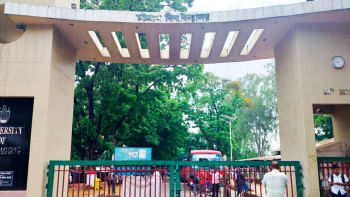November 7: Let the truth be known
OF the many controversies that impinge on some of our historical events, November 7, 1975 remains one. In a society of radical politicisation of events, dates and uprisings it's often challenging to follow the truth from a neutral stance. What the BNP observes as a national Revolution and Solidarity Day is labeled as the Freedom Fighters Killing Day by the Awami League. Moreover, the day with diverse perceptions creates confusion among the minds of many.
BNP's rationale is quite simple: the 4 day long military-cum-civilian revolt not only saved Late General Zia's life, but also paved the path for introducing military dictatorship in Bangladesh. The uprising, beginning on November 3, established Zia's larger-than-life image by sending Colonel Taher to the gallows; nullifying Khondokar Moshtaq's cabinet; heinously snatching away the lives of Brigadier Khaled Mosharraf along with Captain A.T.M. Haider while technically leaving the People's Republic of Bangladesh without a government for 4 days (November 3-7).
Firstly, it's, difficult to perceive how one could brand such an event as a national revolution and solidarity day? Since the outcome of the uprising appeared negative and undemocratic. Secondly, that the AL regime brands it as freedom fighters killing day is no more than exaggeration and exploitation of the event with political motives. True, some notable freedom fighters were murdered during the uprising, but simultaneously their killings were orchestrated by freedom fighters too.
Though a military dictator, the late Zia -- the key beneficiary of the uprising -- was a notable freedom fighter too. We neither vilify nor celebrate the day. We want to address a set of queries that have long been unanswered.
The day actually stands second as a counter-coup in the series of coups during the post- August 15 period after killing of Bangladesh's founding president Sheikh Mujib. Unlike other coups during November 1975, the November 7 one is probably the most misrepresented coup too.
It was the first time during an uprising when the nation was communicated with the theory of "India card." The propaganda machine conveyed a message that two military leaders (Khaled and Haider) were about to hand over the control of the country to India.
Rationally asking: is it really that easy to hand over the authority of an independent and sovereign state through a military takeover? However, the public could not be fooled, and Bangladesh remained as it appeared after 1971.
It's been well over 35 years, but the nation still doesn't know the murderers of two valiant freedom fighters: Brigadier Khaled Mosharraf and Captain A.T.M. Haider. In what circumstances were they killed? Moreover, why are these two sector commanders' deaths not mourned? Why were the print media, during the first week, unable to report about the jail killing and the ongoing power struggle within the army? More surprisingly, why were all editorials on Bangladesh made subject to pre-censorship in India during the first half of November that year?
Up till now the answers to our raised questions along with many more remain hidden.
Historical evidences suggest that the late Colonel Taher was responsible for the killing of Brigadier Khaled along with other officers as per his statement, but then again it's not proven and declared through a verdict by the legal authorities. However, in March 2011 a full-fledged verdict was published regarding Late Colonel Taher's murder, where the late Zia has been mentioned as the main culprit for hanging him.
Unfortunately, most of the books, articles and media reports on the event of November 7 uprising have come up with biased often inconclusive reactions and statements regarding the roles of the top military brass. Even the book titled Bangladesh: the unfinished revolution by Lawrence Lifschultz did not appear to be unprejudiced. But one characteristic among the officers during the coup is evident.
The officers: Zia, Taher, Khaled, Haider, along with the known and unknown officers at the time, had played questionable roles for assuming and influencing state power -- directly or indirectly. Their actions during the coup are disputed, and yet all of them were spirited freedom fighters.
The mystery-shrouded November 7 needs a re-write as far as the truth is concerned. There is no shame in revealing the facts of a past event that for long seemed misapprehended and politically exploited.
Let's finish it with a first-hand experience about the importance of knowing true history gathered in Germany last month. The writer had the opportunity to visit the infamous Nazi concentration camp Dachau near Munich. Over half the visitors were groups of children from different public schools. When asked about the reason to one of the teachers she astutely replied: "We believe it's important to reveal the facts of the much sinister Nazi past from which the students can take sad but true lessons for the future. We don't want a repetition of that past." Her reply was not only bold but impressive.
Let the facts and events of November 7 be known, and without distortions and political prejudices.
The writer is current affairs analyst, The Daily Star.

 For all latest news, follow The Daily Star's Google News channel.
For all latest news, follow The Daily Star's Google News channel. 



Comments